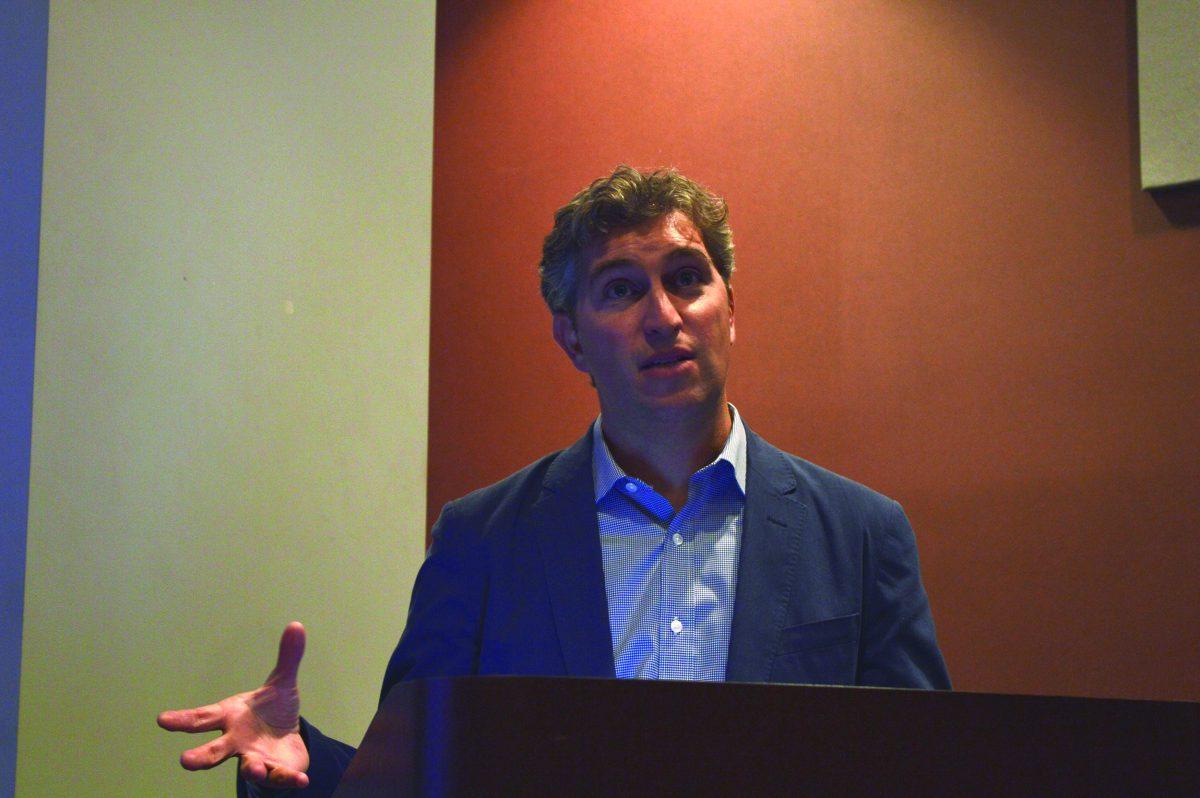Journalist and non-fiction author Andrew Blum visited Mississippi State University’s Fowlkes Auditorium on Oct. 24 to discuss “The Infrastructure of Weather.” The event was supported by MSU’s Department of Geosciences, with the support and co-sponsorship of the Department of Communication, Department of English and the College of Arts and Sciences. Blum’s previous 2012 novel, “Tubes: A Journey to the Center of the Internet,” was a New York Times Best Seller and informed readers eager to understand how the Internet functions. Following extensive research, Blum presented a lecture to help explain the history and role of meteorology in human society.
The lecture distilled segments from his latest book, “The Weather Machine: A Journey Inside the Forecast.” Published in June 2019, the book explores the infrastructure behind weather forecasts. Through his lecture, Blum dove into the history of weather calculations, the people who built the methods and what it reveals about the planet’s climate. The talk primarily centered around telegraph communication, satellite launches and labs where scientists work to create supercomputer models of the atmosphere. Blum also noted how the weather is a global partnership between nations sharing public data for the benefit of humanity.
Blum said we have entered a golden age of meteorology. He noted our current modeling tools allow us to predict weather more accurately than ever. He also tied the recent “Sharpie Gate” fiasco with Hurricane Dorian and how we have learned to trust these modeling tools. His main concern was how to guarantee the fragile international alliances that allow our modern weather services to exist. The concept of privatization of weather data was a major topic over which he expressed concern.
“The recognition is that there are only 8-10 weather services around the world that are going to pay for data- that leaves out 181 similar states that do not have that capability. Public data has been a basic foundation of something meteorologists do for the global good for the length of modern meteorology,” Blum said.
When discussing the limitations of funding, Blum considered the impact that private weather data could have on humanity.
“The hope or goal is that if you have private observations there is some cost savings. You could have private observations done more efficiently than public observations, but that is a pretty stark turn from 150 years of meteorological tradition. It also doesn’t acknowledge the success of the global system as it exists today,” Blum said.
Savannah Munn, an MSU sophomore majoring in political science and public relations, shared her thoughts on the event.
“I really enjoyed how he bridged science and communications. He translated it into a way that people could understand and increase their learning,” Munn said.
Munn also said she appreciated how his lecture illuminated the history of the field and how it changed over time.
“I like that he was aware of how sometimes science is twisted against what its original purpose is, which is to inform,” Munn said.
Philip Poe is an associate professor and the Journalism Coordinator for the Department of Communication at MSU. Poe said he considered the lecture to be enlightening and stressed the importance of Blum’s journalistic approach to his material.
“The skills that we are trying to teach are the same thing that he is doing in his professional work,” Poe said.
Poe said having an understanding of weather systems is beneficial for everyone.
“Blum explained extraordinarily technical practices in human terms,” Poe said. “Even if you’re not interested in meteorology, everyone is a follower of weather. The conditions shape how we treat each day.”















